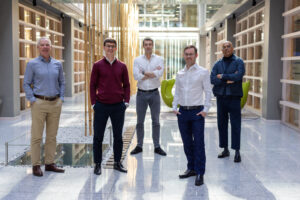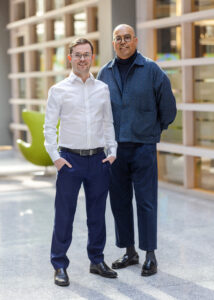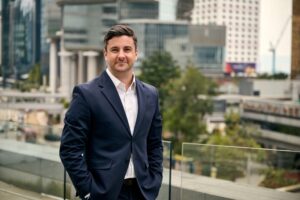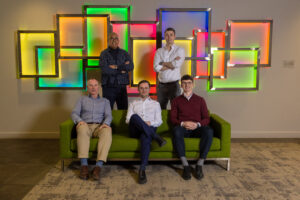Fidelity International, inaugural winner of The TRADE’s Foreign Exchange Trading Desk of the Year Award 2024 was – and continues to be – recognised across the street for its thriving work across the global FX space.

When it comes to what has contributed to the desk’s success story, Nigell Todd, head of global FX trading at Fidelity, asserts that the individuality of those who make up the team is key, pointing to the importance of not just pulling your weight, but also knowing what that weight is.
“Everyone contributes in their own way and style is very important – it’s key because everyone is different and bringing your own genuine way of thinking, thoughts and ideas is super important to a conversation.”
He adds: “Although the team is quite small, our footprint is global and we pride ourselves on our credibility and the relationships that we’ve built.”
Todd heads up a global FX team, responsible for both the Dublin and APAC desks. Geoff Healy, senior FX trader, oversees the foreign exchange capabilities out of Hong Kong for APAC and the team’s reach is set to be further expanded in the near future. Mark Mulholland, FX trader currently based in Fidelity’s Dublin office, is soon to make a move to Singapore, setting up a satellite desk (set to go live in May) to supplement the APAC offering.
Consequently, two new traders have been appointed to the Dublin team to supplement Mulholland’s departure.
“Our priority is always reviewing our investment capability and ensuring we can support the areas of growth. They may be in new instruments or enhancing our electronic capabilities. We’ve also been able to progress on some emerging market capabilities in recent years and that has given us the further drive and confidence to explore other areas this year,” enthuses Todd.
“Clearly every market is different but having a global remit allows us to share and apply learnings to different challenges and markets consistently.”
Diversity of thought, a valuable asset
This central value of not only appreciating, but also proactively fostering a team that is filled with individuals who have different experiences, and subsequently varied capabilities, definitely appears to be paying off for the team.
“We’re fortunate at Fidelity that we’ve got a very unique set of individuals sitting in different areas. Everyone has their own core interests which then leads into how they fulfil their roles within the team,” Healy tells The TRADE.
As well as appreciating the enhanced way of working that accompanies giving traders the freedom and support to leverage their unique ways of thinking, Todd explains that it is equally important to acknowledge the importance of those who work in the background.
“We have to recognise the way that people contribute,” he says. “As a small team you may have somebody working on a particularly important project but there are people on the team doing the groundwork which allows for those other team members to focus on specific projects and niches. Everything is a team effort, hence this FX Trading Desk of the Year award is a team win!”
Healy agrees, adding: “When it comes to personnel, we’re fortunate at Fidelity that we’ve got a strong set of individuals sitting across the regions, each with different core strengths and interests allowing them to add value in different areas.”
Hard skills get the job, soft skills get you noticed
When it comes to the group dynamic, the team is quick to highlight that the size of the desk informs a lot of the pursuit for well-rounded individuals. As Todd explains, each individual on the desk needs to be able to do a bit of everything.
 He adds: “In my global seat, as part of my remit, I’m able to ensure global consistency and cohesive approaches to workflows and policies and procedures and how we face the street and conduct broker reviews.”
He adds: “In my global seat, as part of my remit, I’m able to ensure global consistency and cohesive approaches to workflows and policies and procedures and how we face the street and conduct broker reviews.”
The need for flexibility to succeed as a trader has become the topic du jour across the industry at various events and conferences over the last few years. Conversations around what makes for the ‘perfect’ trader has shifted focus – no longer is the role solely relationship-focused or solely data-focused, it has become something in between.
“Something I heard recently rings very true, it’s the hard skills that get you the job, but it’s the soft skills that get you noticed […] building upon those soft skills is important and sometimes probably overlooked,” says Todd.
“What also goes hand in hand with that is putting yourself forward for opportunities, sometimes one door closes another door opens. Always try to take the opportunities when they come because that gives you exposure to new people, new teams, new ways of doing things.”
The team share the ethos that proactivity is essential to the success of a trader. Though the desk is clearly imbued with a focus on continual evolution in order to get the best outcomes, the soft skills remain what makes the difference – style and substance, so to speak.
“[…] As an individual, you can either be an all-rounder or a specialist and I don’t think that one is better than the other. At the end of the day, the one quality you can’t do without is hard work. If you don’t approach trading with hard work, you’re going to be found out,” affirms Mulholland.
Healy agrees that the focus should be on going that step further, highlighting that one of the most important lessons he’s learnt when it comes to trading is the importance of speaking up and questioning things if required.
Something which, of course, requires the right environment to allow traders the confidence to do so.
“If something doesn’t feel right, we always want our traders to flag it first. When managing risk, it’s important to push back sometimes and not take everything at face value. Despite the advancements of technology over the years, two and four eyes checks are still valuable. When trading voice, ask for better if you think it’s reasonable […] if you don’t ask, you don’t get.”
Mulholland further echoes this: “I’ve found that the best approach is not to have a team full of the same personalities. It’s not good to have a team of only good cops or bad cops if you will, but to have a mixture of personality types. The same applies to skills. You don’t want a team solely focused on technology while neglecting soft skills. The best teams I’ve ever worked for, and certainly the one I’m currently working for, have a mix of personalities and skills.”

Geoff Healy
On the other hand, when it comes to those hard skills it’s a truth universally acknowledged that those on the buy-side who don’t take technology’s rapid incline seriously, will fall behind.
“I always encourage a team to have a good understanding of the end-to-end process and dependencies. Having this understanding puts somebody in a unique position to troubleshoot and challenge, propose new workflows or ideas,” says Todd.
Healy confirms that nowadays, Fidelity seeks out people who are more technology-focused and have more technical skills than in the past, but explains that from his view what is always helpful is for traders to have an interest in financial markets including a wide-ranging macro view of the industry and of capital markets.
He adds: “The core qualities we seek in traders such as communication skills, proven ability to work under pressure, a strong character and a keen attention to detail remain unchanged and are still vital. Finding the right candidates can be a delicate balancing act.”
A hands-on approach to technology
The real money world is often considered one wherein change is slow to come, even compared to other industries outside of asset management or finance, with settlement times seemingly set in stone and established processes continually maintained. However, this doesn’t mean that there isn’t room for innovation across the space, and the Fidelity team are keen to embrace the opportunities.
Speaking about his perspective on continued technological developments, Todd explains that he believes one must invest time to reap real rewards.
“Technology and data are like the heartbeat, it’s how we evolve, but it’s understanding the data and having proper governance and protection and standardisation which rules. To ensure data is reliable and can be trusted my approach is fairly hands on. I always view things with an attitude that it’s not somebody else’s problem to fix.
“[…] I very much see this as an opportunity to get involved and drive the outcome that we’re looking for. The earlier you get involved in that process, the higher the level of influence in that solution – you own the outcome.”
When it comes to making the most of what you have, the industry is increasingly looking to ‘buy before build’ or ‘buy and build’ as opposed to one or the other.
Investing in a high touch approach from the off is therefore not only refreshing, but demonstrably effective.
Mulholland explains that from Fidelity’s side, technology and data are massively important to the team, with the approach always being to “meet specific needs” without seeking out all the frills when it comes to a relatively passive FX desk like theirs.
“We’re not a proprietary hedge fund, so there’s no point in spending a lot of money on all the bells and whistles […] what’s more important is what you can do with what you have, especially when it comes to the data side of things,” he says.
“You don’t necessarily need to spend a lot of money on third party vendors for your data capabilities to succeed, but what you do need to do is make sure what you’re doing in house is really efficient and to the best of your ability – that way you can make sure that you’re getting the best bang for your buck or maximising the cost savings.”
Speaking about the practical use cases when it comes to data considerations on the trading desk, the team highlights that data is particularly key as the FX team looks to further expand.
From the APAC perspective, Healy highlights TCA in particular, noting that this data has helped the firm achieve a lot of efficiencies in recent times, labelling it an important aspect of what the firm has done in the last few years.
He further adds that the timing of other innovations has also been instrumental, noting that the focus has, and remains, very much on leveraging these changes to further advance the FX team, reminding The TRADE that “FX is a fundamental piece of investing in any market”.

John O’Callaghan, Nigell Todd, Mark Mulholland, Blair Nicol, Darragh Mullin
He adds: “A big focus for us is naturally technology and system improvements. Advancements in execution venues and order management systems in recent years have led to the ability to use different execution styles than we could have done previously. We’re focused on leveraging these changes in our execution process to reduce costs and to try to use system enhancements to put guardrails in place and help reduce manual intervention and errors.”
The next step in the journey
This hands on approach to market development is something Todd also makes sure to foster when it comes to the traders themselves too – not just celebrating the wins but embracing and addressing any challenges as well.
Speaking about the importance of investing on an individual level in the pursuit of team successes, Todd explains that this is one of the more rewarding aspects of his role, highlighting that there is a direct correlation between mentoring, helping a trader build their capabilities and the desk as a whole finding new, more efficient solutions.
“Nigell is extremely hands on, has a great risk mindset and has really helped to mould the FX trading desk into what it is today. I started on the team in Dublin with Nigell and we have carried over a lot of the practices he helped shape over to this region as well. He deserves a lot of credit,” enthuses Healy.
Indeed, being the global head of FX is no easy task, but it’s clear to see from recent success that a lot goes into achieving cohesiveness on a global level. Maintaining these core values which make the desk work will undoubtedly allow the team to continue to enjoy the fruits of their labours.
When it comes to what characterises the success of the team, it’s all about being a trusted partner, both internally and externally, says Todd.
“How you treat others is key, doing so with humility and respect and in a way that is credible is paramount. I always refer to the saying, it’s not what you do, but how you do it […] It’s important to bring people along the journey.”